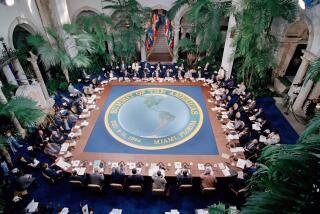Allies Cool to Reagan Plans for ‘Star Wars,’ Nicaragua : Proposals to Limit Arms Welcomed
- Share via
BONN — President Reagan ran into trouble over Nicaragua, his prized “Star Wars” plan and world trade talks at the Western economic summit today, but won allied leaders’ support for his arms control efforts.
With the summit to close Saturday, there was no agreement on U.S. efforts to begin new trade talks in 1986.
A political declaration approved by leaders of the world’s seven industrial democracies welcomed the resumption of arms talks with the Soviet Union in Geneva. “We appreciate the positive proposals” of the Reagan Administration, the document said.
“We urge the Soviet Union to act positively and constructively in order to achieve significant agreements there,” the statement said.
But West German Foreign Minister Hans-Dietrich Genscher, asked whether there would be any statement issued on Reagan’s Strategic Defense Initiative, the formal name for “Star Wars,” replied, “Nein.”
Nicaraguan Trade Embargo
The United States also failed to win specific endorsement for its decision to impose a trade embargo on Nicaragua, announced shortly after Reagan’s arrival in Bonn Wednesday.
“Cooperation in the embargo was never sought by the United States nor given by any of the Europeans,” Genscher told a news conference.
But a British official said, “There was no attempt to put the Americans in the dock as it were, but it would be fair to say that certain reservations were expressed about the effectiveness of sanctions. No one spoke in favor of sanctions except (Secretary of State George P.) Shultz.”
The Nicaraguan question was discussed at a meeting of foreign ministers, while the heads of state and government of the seven summit powers--the United States, Canada, Britain, France, Italy, West Germany and Japan--debated world economic and trade issues.
An Italian spokesman said Foreign Minister Giulio Andreotti voiced the objection of the entire European community to sanctions, saying they were ineffective.
Fears Expressed
The British official, who asked not to be identified, said the fear was expressed that sanctions could drive Nicaragua further into the arms of the Soviet Union and Cuba.
“They’re not satisfied with our course of conduct, but it was something we felt we had to do,” acknowledged White House Chief of Staff Donald T. Regan.
France and Canada, in particular, voiced objections.
In the main talks about world trade and economic issues, there was considerable criticism about the U.S. budget deficit and the high interest rates propelling the dollar upward against foreign currencies.
“This was the biggest complaint,” said West German government spokesman Peter Boenisch.
He said the leaders had rejected Reagan’s call for them to expand their economies in order to act as “locomotives” for world growth, apparently fearing that this would spark inflation.
Boenisch added that all the leaders were concerned about rising protectionism, and there was broad support for Reagan’s call for talks early next year to reduce trade barriers.
But French President Francois Mitterrand held out against setting a date for the talks, insisting that the question of monetary reform should take priority.
More to Read
Sign up for Essential California
The most important California stories and recommendations in your inbox every morning.
You may occasionally receive promotional content from the Los Angeles Times.









